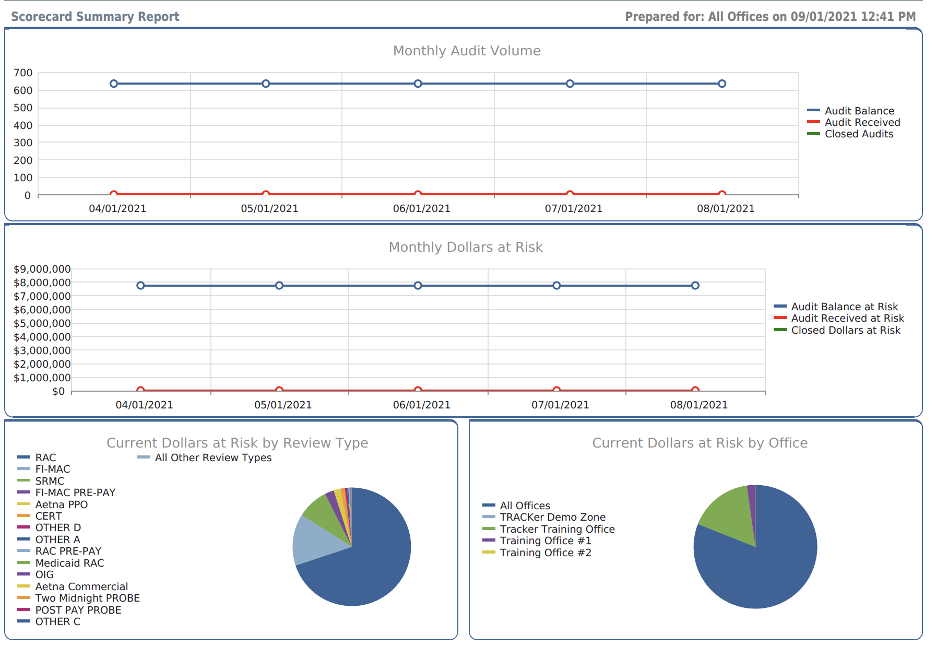
When making a change or improvement within your healthcare audit process, reporting is often thought of as the last piece of the puzzle or even overlooked entirely. Many managers are forced to implement changes to their team or process, and only report at the end when they think they have enough data to evaluate how their decisions played out.
But for agile teams, reporting is simply too important to be relegated to the caboose. A smart team puts reporting first when changing process or improving department function, basing decisions off of deep data review and analysis.
Understanding the value of reporting should be among a revenue cycle team’s top priorities. Investing in a solution that provides you with access to real-time data not only benefits operations and analytics, it also establishes a numbers-driven and system for process improvement.
Operational Benefits of Audit Reporting
Every day, your team is receiving audit requests, compiling documentation and awaiting results. With such a similar process day in and day out, it can be difficult to see a need for improvement or change. This is where reporting comes into play. Specific benefits include the following.
• Audit status
Frequent reporting shows where your audit status is at any given time. How many audit requests have you received, how many have you submitted documents for? Which audits are collected, reviewed, awaiting a result, appealing or otherwise in progress? How many have you closed?
There’s huge overarching value in truly understanding the current status of your dollars at risk. Revenue cycle leaders should always be aware of any potential take-backs or adjustments as accounts move through the audit process.
• Final resolution outcome
What was the outcome of your audit? Were you successful in protecting your at-risk dollars? Were dollars adjusted or taken back? A final resolution report will show your overall success rate by measuring these outcomes. Consistently tracking data can show any immediate lapses in a team’s success rate, which managers can flag for further investigation and future improvement.
• Cycle time
Cycle time is another overarching metric measuring your team’s productivity. How long does it take you to move an account through the process and are you adhering to critical response deadlines? There are things you can’t control in this process, of course, like how long the audit agency takes to respond back to your documentation submissions. But you can control, to a certain extent, how long it takes your staff to go from being notified of the audit to mobilizing and initiating the response process.
Consistently tracking cycle time can, again, show any immediate red flags. If a team takes a full extra week to submit a Medicare audit response in comparison to the last time they processed the same or a similar audit should be investigated.
Process Improvement Benefits of Audit Reporting
Reporting doesn’t just improve the overarching key performance indicators (KPIs) that define your operational success; It can also go deeper, allowing you to dive into very specific aspects of your team’s process. Access to data allows you to identify options for improvement and measure the results of your changes. Specific benefits include the following.
• Root Cause Analysis
A comprehensive set of reports can help find and recognize key patterns. If there’s a type of claim, provider, location or diagnosis code that’s continually resulting in lost audit dollars, you’re able to analyze the data and point to a specific cause. Then, you can implement informed changes that proactively reduce the possibility of a future audit down the road.

For example, a team that’s constantly tripped up by prior authorization audits can lay out and examine the hospital’s current prior authorization documentation and process and identify areas for improvement and action items. Then, continued reporting analysis should show an improvement in audit results under this category. If there’s no discernible improvement, it’s back to the drawing board for more changes.
• Early and Proactive Action
When you begin monitoring success, you’ll be able to spot problems early on, often before they actually become an issue. The ability to take proactive action can save large sums of money in the long run.
• Internal & External Reporting Requirements
Audit departments are often required to create specific reports to meet requirements from both within their hospital or health system and outside of it from external agencies. Some reports are required by law as per local and state governments. Internal reporting may be required to prove to leadership that your department has met specific KPIs. Good audit reporting software makes it easy to generate these regular, mandatory reports for all parties.
Data Analytics Benefits of Audit Reporting
Finally, using real-time software to generate continual reports harnesses the power of data analytics to create optimal processes. Specific benefits include:
• Pulling raw data
An ideal solution has the capacity to export raw data elements that can then be imported into other reporting tools to aggregate data across departments and systems. For example, if you’re working to collect a lot of information from different departments or teams, an ideal tool would have the capability to pull that data together and export it into an Excel spreadsheet.
• Custom reporting
Some reports are mandatory, required by internal or external stakeholders. Others are good to have on hand to monitor your team’s process. No other team in the world works exactly like yours. Sometimes even teams within the same hospital or even the same department can have entirely different processes or KPIs. The ability to build your own custom reports within your reporting software and access the data in the format of your choosing is critical.
The Best Healthcare Audit Reporting Software
For those who want to move even further into data analytics and process analysis than custom reporting or data aggregation, Bluemark’s software family of audit solutions can assist.

• Deeper analytical capabilities
Pathway is Bluemark’s deep-dive reporting tool designed to enhance standard reporting. It allows the user to present the data in a variety of graphical formats, which can be extremely helpful when presenting data to an outside party or other team members. Data can be viewed in a line graph, pie chart or other visual options for better data presentation.
• Productivity scoring
Bluescore is a proprietary algorithm that aggregates user activities based on a point system with the intent of delivering a simple score and method to compare workers’ output. It provides a methodology for assigning a point value to each step in the audit process involving a staff member and a framework for analysis and evaluation.
Worker productivity is complex and multidimensional, Bluescore simplifies the equation and provides a key number for this measurement. This framework is custom configured for individual organizations interested in measuring individual proficiency in addition to department wide productivity.

Ultimately, good reporting can help with surface-level process improvements. But great reporting, backed by real-time, specialized software can save you thousands of dollars and drastically improve your team’s efficiency. The benefits surrounding operations, process improvement and data analytics cannot be ignored. From now on, make good reporting the engine that powers your work—not the caboose.
Ready to rev up your reporting? We keep example reports on hand that show how enhanced data tracking and analysis can work for your team. Let us know if you’re interested in taking a look.




